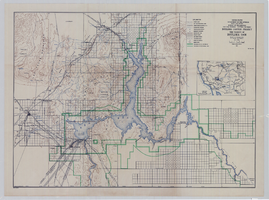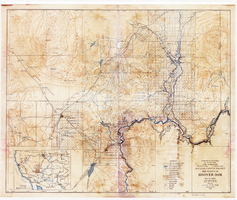Search the Special Collections and Archives Portal
Search Results
Gay and Lesbian Alliance Against Defamation (GLAAD): Project 21, 1993
Level of Description
Archival Collection
Pagination
- Previous page ‹‹
- Page 7
Archival Component
Las Vegas Fiber Arts Guild oral history project interviews
Identifier
Abstract
The Las Vegas Fiber Arts (LVFA) Guild oral history project interviews (2020-2023) consist of interviews conducted by the LVFA Guild of their membership. The interviews cover a wide range of topics, and members discuss their individual history of weaving and the fiber arts, preferred methods, and different types of fibers. Interviewees also discuss mentors within the craft, their level of involvement with the guild, and the different events that the LVFA Guild organizes in Las Vegas, Nevada. Digital audio and transcripts available.
Archival Collection
Las Vegas Centennial Mural Project - gay/lambda mural, 2005
Level of Description
Archival Collection
Pagination
- Previous page ‹‹
- Page 7
Archival Component
David Green oral history interviews
Identifier
Abstract
Oral history interviews with David Green conducted by Dennis McBride on August 20 and October 22, 1999 for the Las Vegas Gay Archives Oral History Project. In the interviews, Green discusses his contributions to the founding and operation of the Gay and Lesbian Community Center of Southern Nevada, also known as The Center. He recalls purchasing the first building used for The Center in 1993, anecdotes about other founding members, and details regarding the administrative management at The Center. Green also discusses his early life in New York, understanding his sexuality, and his family's reactions.
Archival Collection

Topographic map of Boulder Canyon Project, Boulder Dam area, 1940
Date
Description
Image
Rick Arpin oral history interview, 2024 May 22
Level of Description
Scope and Contents
Oral history interview with Rick Arpin conducted by Claytee D. White and Stefani Evans on May 22, 2024 for the Game On! The Oral History of Las Vegas Sports project. In this interview, Las Vegas native Rick Arpin reflects on his East Las Vegas childhood, his career in accounting and finance, and his role with MGM Resorts in conceiving, building, and operating the T-Mobile Arena, home of the Vegas Golden Knights. Arpin mostly focuses on the idea of what would become T-Mobile arena, possible sites and designs for the arena, and putting everything on hold through the financial crisis (2008-2009) and the building of City Center (2008-2010). He talks about MGM Resorts realizing they had to manage all sports and entertainment venues across the company, including security, vendors, booking, and all operations. Arpin recalls the multiple people, institutions, and determination that helped chip away the "stigma" that professional and collegiate sports felt clouded Las Vegas as a location for professional or collegiate sports. Digital audio available.
Archival Collection
Pagination
- Previous page ‹‹
- Page 7
Archival Component
#57089: Parenting Project, 1987 October 22
Level of Description
Archival Collection
Pagination
- Previous page ‹‹
- Page 7
Archival Component

Topographic map of Boulder Canyon Project, Hoover Dam area, 1932
Date
Description
Image
Gay Life Newsletters
Identifier
Abstract
The materials consist of monthly newsletters dated from September 1984 to August 1985 published by the National Association of Lesbians & Gays, a non-profit corporation based in Reno, Nevada. The newsletters in this collection are titled Gay Life, beginning with the inaugural issue in September 1984. The collecton includes one issue of the newsletter after its name was changed to Stonewall Voice! in August 1985.
Archival Collection
Patrick W. Carlton Papers on the Oral History of the Public School Principalship Project
Identifier
Abstract
The collection is comprised of University of Nevada, Las Vegas (UNLV) professor, Dr. Patrick W. Carlton's, research files dating from 1982 to 2011 in the "Oral History of the Public School Principalship" Project. The papers include research files about principals in Las Vegas, Nevada and Superintendents on the Clark County School District.
Archival Collection
